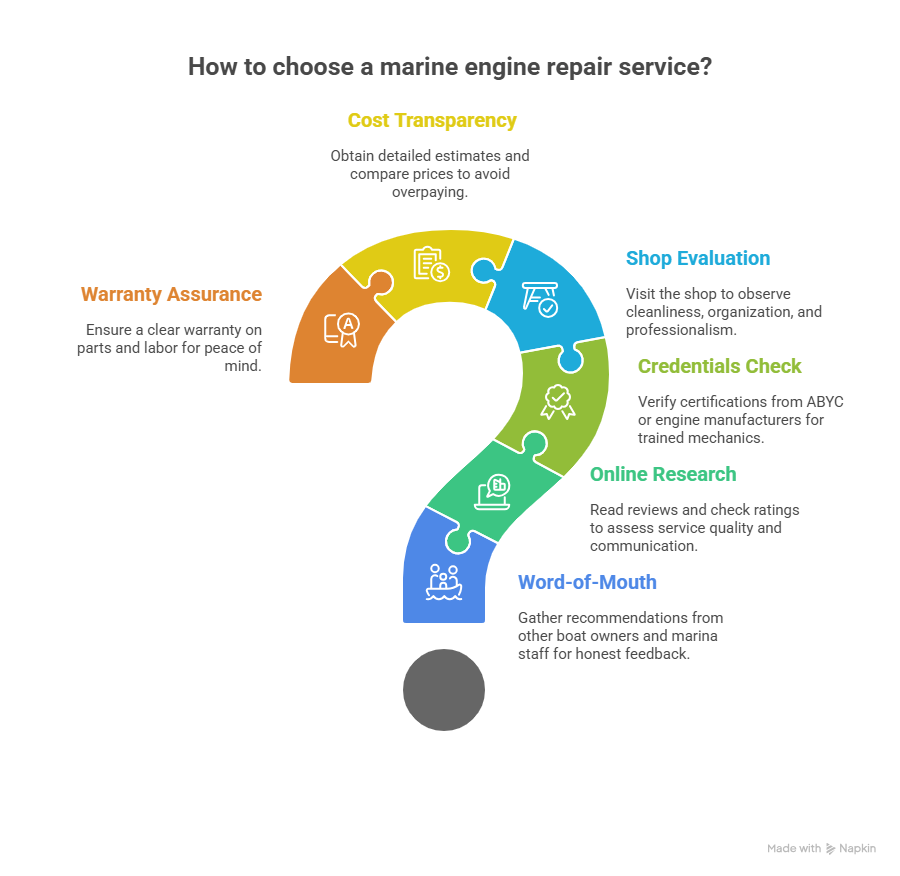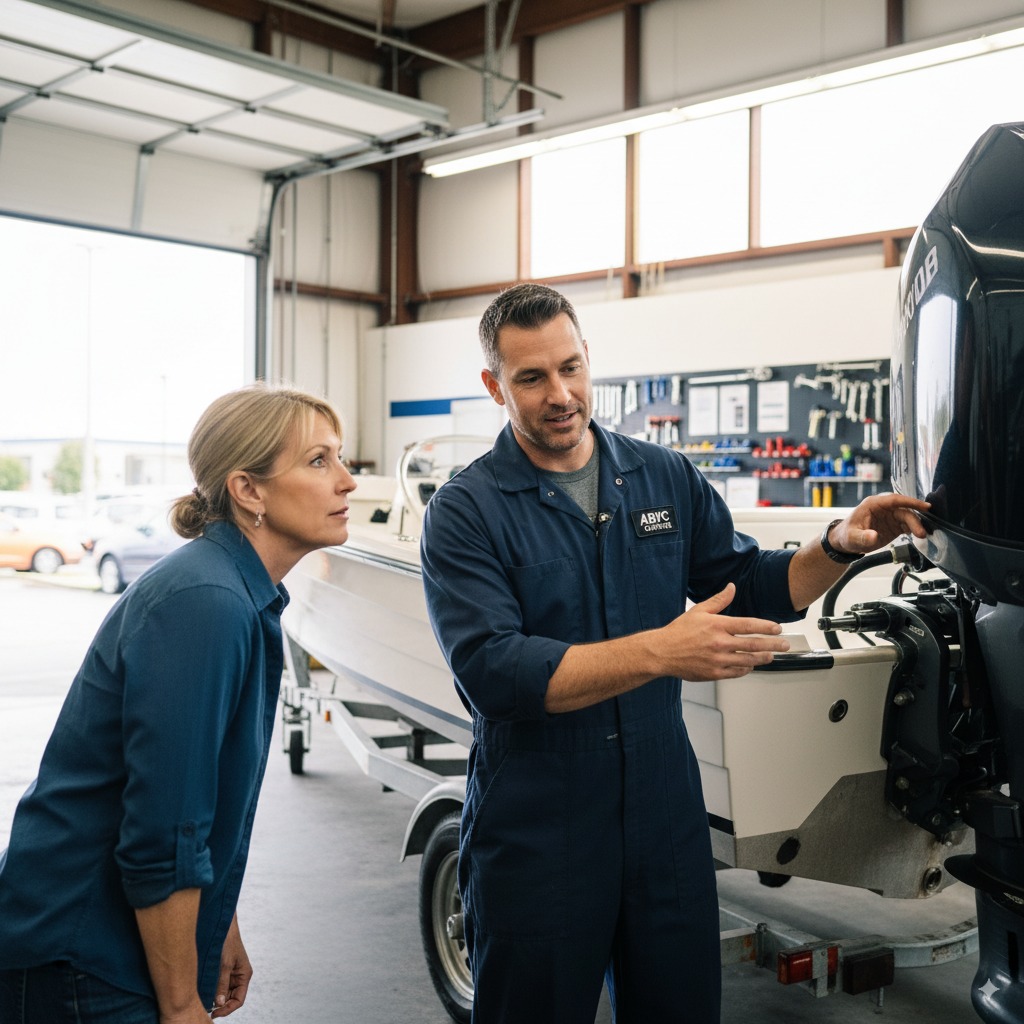I’ve spent the last 15 years with grease under my fingernails, fixing boat engines here in South Florida. And let me tell you, the stories I’ve heard could fill a book. The most heartbreaking ones always start the same way: a boater trusted the wrong person with their engine. A cheap fix that led to a catastrophic failure offshore, or a small issue that spiraled into a multi-thousand-dollar nightmare.
I remember a guy, Mike, with a beautiful 30-foot cruiser. His engine started losing power, so he took it to a shop that gave him a quote that was almost too good to be true. They “fixed” it in a day. Two weeks later, he was 10 miles out when the engine seized completely. The first shop had used a cheap, aftermarket part that failed and took the rest of the engine with it. The process of choosing a marine engine repair service isn’t just a task; it’s one of the most important decisions you’ll make for your boat. My goal here is to give you the inside scoop so you don’t end up like Mike.
Table of Contents
Why This Choice Matters More Than You Think
Let’s get one thing straight: your engine is the heart of your boat. When you’re choosing a marine engine repair service, you’re picking a heart surgeon. It’s not about finding the cheapest or quickest option. It’s about safety, reliability, and protecting your investment. A good repair means peace of mind. A bad one? It means worrying every time you leave the dock.
I’ve seen firsthand how a shoddy repair can lead to bigger breakdowns, voided warranties, and even dangerous situations on the water. Quality work isn’t an expense; it’s an investment in your safety and your boat’s future. The process of choosing a marine engine repair service should be handled with care.
How I’d Find a Good Mechanic (If I Wasn’t One)
If I needed work done and couldn’t do it myself, here’s exactly how I’d approach choosing a marine engine repair service.
1. Ask Around the Docks
Before I’d even touch Google, I’d walk the docks. I’d talk to other boat owners, especially those with boats similar to mine. I’d ask the staff at the local marina. Word-of-mouth in the boating community is powerful and usually brutally honest. You’ll quickly learn who to trust and who to avoid.
2. Do Your Online Homework
Once I have a few names, then I’d go online. I’d look at reviews on Google, but I wouldn’t just look at the star rating. I’d read the actual reviews. What are people saying? Do they mention specific mechanics? Do they talk about good communication? These details matter when choosing a marine engine repair service.
3. Check for Credentials
This is a big one. I’d look for shops that are certified. Look for credentials from ABYC (American Boat and Yacht Council) or certifications from specific engine manufacturers like Yamaha, Mercury, or Volvo Penta. This tells you the mechanics have been trained and are up-to-date on the latest tech. A shop that invests in training is a shop that cares about quality. This is a crucial step in choosing a marine engine repair service.
Evaluating the Shop: What to Look For
Once you’ve got a short list, it’s time to dig deeper. Here’s a simple table to help you compare potential shops. This is my personal checklist for choosing a marine engine repair service.
| Feature to Evaluate | What a Good Shop Looks Like | Red Flags to Watch For |
|---|---|---|
| Certifications | ABYC/Manufacturer certified. Proudly displayed. | “We don’t need papers.” No certs to be seen. |
| The Shop Itself | Clean, organized, and professional. | Messy, cluttered, and chaotic. |
| Communication | They listen, explain things clearly, and are happy to answer questions. | Vague answers, rushing you off the phone. |
| The Estimate | Detailed, written, and broken down by parts and labor. | A number scribbled on a napkin. “We’ll see what it costs.” |
| Parts Policy | They use genuine OEM parts unless you approve an alternative. | They push cheap, no-name aftermarket parts. |
| Warranty | A clear, written warranty on both parts and labor. | “Don’t worry, we stand by our work.” (But won’t write it down). |
Don’t be afraid to visit the shop. You can tell a lot about a business by how they keep their workspace. A clean, organized shop usually does clean, organized work.
Understanding the Engine You Have
When you’re choosing a marine engine repair service, it helps to know that not all engines are the same. A mechanic who is a wizard with Yamaha outboards might not be the best choice for your inboard diesel.
- Outboards: These are the most common and generally the most accessible. Still, they have their own quirks.
- Inboards (Gas & Diesel): These are more complex systems, often in tight spaces. You need a mechanic who is comfortable working inside a boat.
- Diesel Engines: These are a different breed altogether. They require specialized tools and knowledge. If you have a diesel, find a diesel specialist.
Ask the shop about their experience with your specific make and model. A good shop will be honest about their strengths.

Costs, Estimates, and Not Getting Ripped Off
Let’s talk money. Marine repairs are expensive. Labor rates can run from $100 to $150 an hour or more. But a good shop will be transparent about the costs.
Always, always get a written estimate before any work begins. A vague estimate is a huge red flag. And if a quote seems way cheaper than everyone else’s, be suspicious. Corners are likely being cut somewhere. A key part of choosing a marine engine repair service is trusting the financial side of the transaction.
FAQ: Questions I Get Asked All the Time
Is it okay to use aftermarket parts to save money?
Sometimes, but it’s risky. For critical components, I always recommend genuine OEM (Original Equipment Manufacturer) parts. They are designed for your specific engine. A cheap part that fails can cause thousands in damage.
What’s the biggest mistake boaters make when choosing a marine engine repair service?
Chasing the cheapest price. It almost never works out in the long run. Quality work costs money, but it’s cheaper than doing the job twice.
How can I be sure the mechanic is being honest with me?
Ask questions. A good mechanic will be happy to show you the old parts and explain why they needed to be replaced. If they get defensive or evasive, that’s a bad sign.
Should the shop have a warranty on their work?
Absolutely. A reputable shop will offer a written warranty on both parts and labor. If they don’t, walk away. This is a non-negotiable part of choosing a marine engine repair service.
How important is proactive maintenance?
It’s everything. The best way to save money on repairs is to avoid them in the first place. Work with your mechanic to set up a regular maintenance schedule. This is the most overlooked aspect of choosing a marine engine repair service—finding a partner, not just a fixer.
Conclusion: Finding Your Partner on the Water
In the end, choosing a marine engine repair service is about finding a trusted partner. You want someone who cares about your boat as much as you do, who communicates honestly, and who stands behind their work.
Take your time. Do your research. Trust your gut. A great mechanic is one of the best assets a boat owner can have. They provide more than just repairs; they provide peace of mind. And out on the water, that’s priceless.
Author Bio
I’m Alex, a 15-year marine technician in South Florida, ABYC-certified. I’ve seen it all when it comes to boat repairs. My passion is helping boaters make smart decisions, from routine maintenance to choosing a marine engine repair service they can rely on for years of safe, worry-free boating.


Leave a Reply